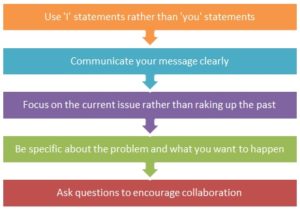Good intentions are often scuppered by a poor choice of words.
Focussing on the issue rather than the person is a good start to resolving conflict. Here are some tips for doing this.
More ‘I’, less ‘You’
Sentences which start with ‘you’ often sound like an attack. Reframe sentences into ‘I’ statements to make them less personal and accusing. Say ‘I feel angry when meetings start late’. Avoid saying ‘you are always late’ or ‘I’m angry because you are late’ (a ‘you’ sentence thinly disguised).
Be direct
Some people use sarcasm or humour in difficult situations. Humour is sometimes effective but open to interpretation. Sarcastic statements like ‘wow, only five minutes late. Must be a record!’ might make you feel better but won’t endear you to the other person. If you’re more interested in positive change over point-scoring, be direct.
Focus on the present
Making absolute statements that include words like ‘always’ or ‘never’ is rarely helpful. A person who hears ‘you’re always late’ will naturally be defensive. Raking over the past may reignite old conflicts. Focus on the current issue.
Be specific
Be clear about what the issue is and what you want to happen. Say something like ‘I’m angry that we were late starting today’s meeting. It’s important to me that we start meetings on time in future.’
Get input
Sometimes it’s better to rephrase a statement as a question. This shows your genuine interest in resolving conflict and hearing the person’s take on things. So you could say ‘I’m angry the meeting started late. What can we do to make sure meetings start on time?’ Collaboration keeps you issues-focused.

Need advice on what to say? Ask Eleanor now. Send your question and we’ll answer it in a future blog post.
Error: Contact form not found.
